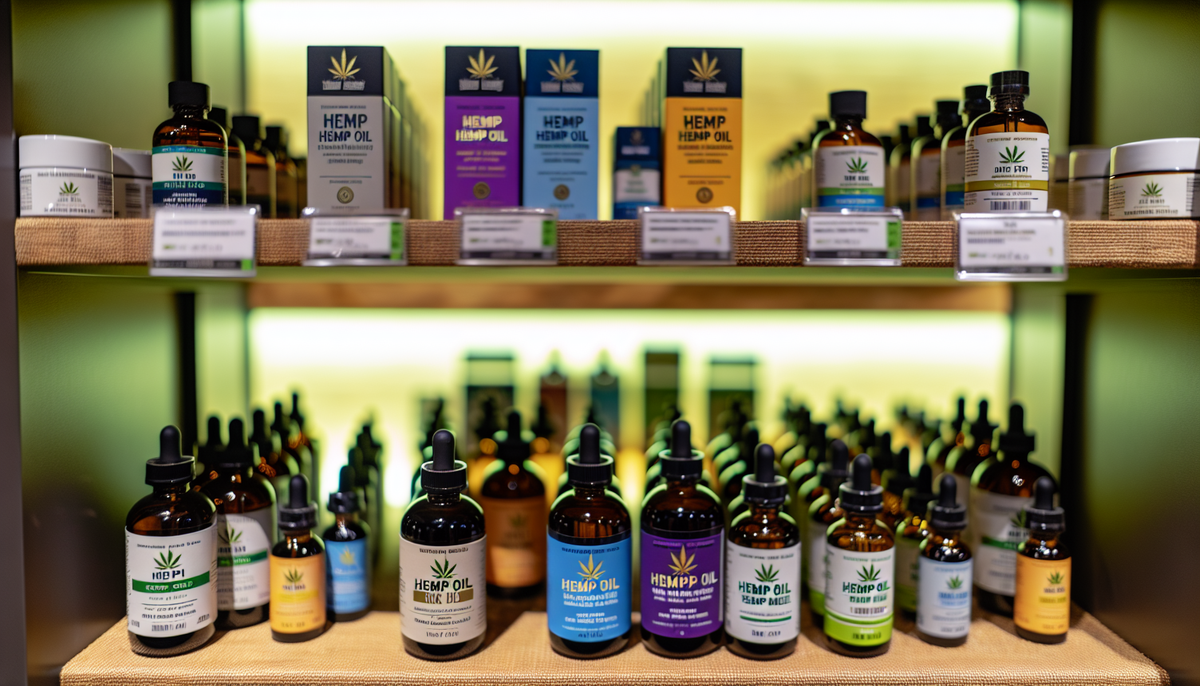Can Hemp Oil Have Side Effects?
Written by: Hunter Podell, Subject Matter Expert and Website Founder
Published: March 15, 2024; Last updated: April 6, 2024
- 1. Key Takeaways
- 2. Understanding Hemp Oil and Its Composition
- 2.1 Hemp Seed Oil vs. CBD Oil
- 2.2 The Nutritional Profile of Hemp Oil
- 3. Unveiling Potential Side Effects of Hemp Oil
- 3.1 Gastrointestinal Discomfort
- 3.2 Neurological Responses
- 3.3 Cardiovascular Considerations
- 4. Interactions with Medications
- 4.1 Impact on Drug Metabolism
- 4.2 Precautions for Specific Health Conditions
- 5. Safety Measures and Recommendations
- 5.1 Choosing Quality Hemp Oil Products
- 5.2 Appropriate Dosage and Use
- 6. Research Insights and FDA Stance
- 6.1 Clinical Trials and Human Studies
- 6.2 World Health Organization and FDA Approvals
- 7. Summary
- 8. Frequently Asked Questions
- 8.1 What are the adverse side effects of hemp seed oil?
- 8.2 Can you feel the effects of hemp oil?
- 8.3 What is the difference between hemp seed oil and CBD oil?
- 8.4 Can hemp oil interact with other medications?
- 8.5 How can I ensure the safe use of hemp oil?
- 9. References
Can hemp oil have side effects? Yes, while often considered safe, hemp oil can cause side effects in some individuals. This article explores the potential adverse reactions you should be aware of, such as gastrointestinal issues and medication interactions. With a focus on factuality and brevity, we aim to equip you with a clear understanding of what to expect from hemp oil use.
Key Takeaways
Hemp oil, derived from hemp plant seeds, is a nutrient-rich substance but differs from CBD oil, which contains cannabidiol and traces of THC.
While hemp oil is considered safe for most, it can potentially cause side effects such as gastrointestinal discomfort, neurological responses like drowsiness and fatigue, and, in some cases, cardiovascular issues.
Hemp oil can interact with various medications by influencing drug metabolism in the liver, and it’s essential to consult with healthcare professionals before use, especially for individuals with certain health conditions or those who are pregnant.
Understanding Hemp Oil and Its Composition

Hemp oil also referred to as hemp seed oil, is derived from the hemp plant’s seeds through a cold-pressing method, similar to the production of olive oil. This precious oil is rich in nutrients such as:
Omega-3 and Omega-6 fatty acids, which promote a robust immune system
Protein, carbohydrates, and fiber, which contribute to overall health and well-being
Calcium, iron, and magnesium, which support bone health and muscle function
Adding hemp oil to your diet can provide numerous health benefits, including other health benefits, making it a valuable addition to your dietary supplements.
However, differentiating between hemp seed oil and CBD oil is necessary. While hemp seed oil is obtained from the seeds and does not possess psychoactive properties, CBD oil is derived from the leaves, stalks, and flowers of both cannabis and hemp plants and may contain minimal levels of THC. This difference is critical in understanding the potential effects hemp oil can have.
Hemp Seed Oil vs. CBD Oil
So, what distinguishes hemp seed oil from CBD oil? Allow us to clarify further.
Hemp seed oil is obtained through cold pressing, which helps retain the seeds’ nutrients.
CBD oil is extracted from the plant’s flowers, leaves, and stems, and it contains substantial levels of CBD.
Various methods, including ethanol extraction and supercritical CO2 extraction, are used to preserve the quality and purity of hemp oils, including CBD oil.
While CBD oil doesn’t possess any psychoactive properties, Remember, THC in cannabis, not CBD, causes the psychoactive effects. Therefore, CBD oil, mainly derived from hemp and a variety of cannabis sativa, typically contains negligible amounts of THC, if any.
The Nutritional Profile of Hemp Oil
In terms of nutrition, hemp oil stands out for its richness. It contains:
Omega-3 fatty acids
Omega-6 fatty acids
Vitamin C
Calcium
Iron
Gamma linolenic acid
Arginine
Magnesium
B vitamins
The ratio of omega-3 to omega-6 in hemp oil is approximately 3:1, indicating that it is a substantial source of essential fatty acids. These nutrients play a significant role in maintaining overall health.
Furthermore, hemp seeds, from which hemp oil is derived, contain all nine essential amino acids, making them a complete protein source. This rich nutritional profile of hemp oil, including hemp protein, contributes to its wide range of health benefits, from promoting heart health to boosting immune function.
Unveiling Potential Side Effects of Hemp Oil

Despite hemp oil being generally deemed safe, it could potentially cause some side effects. These potential adverse reactions can range from gastrointestinal discomfort to neurological responses and cardiovascular issues. We should carefully examine these side effects for a better understanding.
Studies have revealed a variety of side effects associated with hemp oil usage, including ²:
CBD-induced drug-drug interactions
Hepatic abnormalities
Diarrhea
Fatigue
Vomiting
Tiredness
Changes in appetite or weight
Other adverse events
The effects of hemp oil on individuals may vary depending on dosage and individual sensitivity.
Gastrointestinal Discomfort
Hemp oil may cause digestive issues, particularly for those with pre-existing gastrointestinal problems or bowel movement disorders. The impact of Hemp oil on the gastrointestinal system is thought to be attributed to cannabinoid receptors in the GI tract, leading to a potential reduction in disease activity, abdominal pain, and diarrhea. ¹
When deciding the appropriate dosage of hemp oil, factors like dietary guidelines, recommending about two tablespoons for a 2,000-calorie diet, and individual aspects like body weight should be considered. Beginning with the smallest possible dose, like one gelcap or half of one dropper, is recommended.
While hemp oil and its derived products are often used for their potential health benefits, it’s crucial to consult with a healthcare professional before using them for any specific health condition, including high blood pressure.
Neurological Responses

Moving forward, we will discuss the neurological side effects linked with hemp oil. Hemp oil, particularly CBD, is associated with a range of neurological effects, such as ¹:
Neuroprotective and anti-inflammatory properties
Analgesic effects
Influence on brain activity and connectivity
Inhibition of pain receptors
Protection of the nervous system
These effects make hemp oil a promising option for managing neurological conditions.
Indeed, drowsiness and fatigue can be potential side effects of CBD, a constituent of hemp oil. Although the precise dosage that may result in these side effects can differ, they are frequently reported with higher consumption levels. The duration of drowsiness and fatigue induced by hemp oil can vary among individuals. These effects do not have a fixed time frame and may be influenced by dosage and individual sensitivity.
Cardiovascular Considerations

Finally, we need to address the possible cardiovascular implications of hemp oil. Hemp oil, particularly CBD, has the potential to cause cardiac dysfunction. Moreover, polyunsaturated fatty acids in hemp oil, including omega-3 and omega-6, typically positively affect cardiovascular health.
However, an excess of these fatty acids may lead to cardiac dysfunction, high blood pressure, and slow heart rate.
Interactions with Medications
Having explored the potential side effects of hemp oil, we should now examine its interactions with other medications. Hemp oil can potentially lead to drug-drug interactions primarily as a result of its participation in drug metabolism pathways. It can inhibit or induce specific liver enzymes responsible for metabolizing drugs, resulting in changes to drug levels in the body and possible implications for the effectiveness and safety of other medications.
Impact on Drug Metabolism
Hemp oil, particularly CBD and THC, has the potential to impact drug metabolism by potentially inhibiting or inducing enzymes involved in the process. This modulation of enzymes can alter how drugs are metabolized, potentially affecting their concentration in the bloodstream and consequently influencing the drug’s overall effectiveness and safety profile.
Several studies suggest that THC and CBD interact with cytochrome P450 isoenzymes, thereby influencing the metabolism of different drugs. THC functions as a CYP1A2 enzyme inducer, while CBD inhibits multiple CYP450 enzymes, potentially resulting in drug interactions.
Before using hemp oil while on medications, consulting a healthcare professional is necessary.
Precautions for Specific Health Conditions
Specific individuals should exercise caution when considering the use of hemp oil. For instance, individuals diagnosed with Parkinson’s disease should be conscientious, as hemp oil may impact cognitive functions. It’s advisable to seek guidance from healthcare professionals before using CBD oil to evaluate individual risks and monitor potential interactions with Parkinson’s symptoms or medications.
The FDA also recommends refraining from the use of cannabis plants or any form of CBD product during pregnancy because of the potential adverse impact on the developing fetus or breastfed baby, as well as the possibility of contamination with substances that may pose a risk.
Safety Measures and Recommendations

For safety, choose high-quality products and adhere to suitable dosage guidelines while using hemp oil. Selecting high-quality hemp oil products is crucial for safety to reduce the likelihood of experiencing side effects and to guarantee the purity of the product, the absence of contaminants, and the presence of the specified amounts of CBD and other cannabinoids.
Choosing Quality Hemp Oil Products
When choosing hemp oil products, opting for third-party tested products is essential. Purchasing hemp oil products from reputable sources is significant due to the potential variation in product quality. Reputable sources guarantee the procurement of high-quality products that have undergone purity and potency testing and are devoid of contaminants.
The extraction process can also influence the quality of hemp oil. Various extraction methods can result in different levels of extract quality and composition. Variables like extraction time, physical and chemical separation, and the substances utilized in the process can contribute to the variability and overall quality of the oil.
Appropriate Dosage and Use
To reduce the risk of side effects, identifying the correct dosage of hemp oil is critical. The typical recommendation for adults is to consume approximately two tablespoons of hemp seed oil daily, equivalent to a 2,000-calorie diet. This can be taken either directly or mixed into food. It is also advisable to begin with the lowest possible dose and then increase gradually as required.
Moreover, a recommended baseline hemp oil dosage is 0.25mg of CBD multiplied by the individual’s body weight in pounds, to be taken daily. It’s crucial to consult a healthcare provider to determine the appropriate dosage of hemp oil for your needs, as it may differ depending on:
individual health circumstances
body weight
age
the concentration of hemp in the product.
Research Insights and FDA Stance
Although hemp oil has potential benefits and side effects, more research is required. While some clinical trials and human studies suggest potential health benefits of hemp oil, the FDA has yet to approve it as a dietary supplement, emphasizing the need for more research.
Clinical Trials and Human Studies
Limited evidence exists for hemp oil’s health benefits. Clinical trials and human studies have documented the potential health benefits of specific formulations of hemp oil, suggesting positive effects on pain, anxiety, and depression symptoms. Additionally, human studies have indicated hemp oil’s potential to reduce cravings and support addiction treatment, with the dosages tested showing no severe side effects. However, some participants did report increased diarrhea and fatigue.
The ongoing clinical trials on hemp oil are exploring a range of therapeutic potentials, with a focus on investigating the effects of cannabidiol (CBD) on:
Chronic pain
Anxiety
Insomnia
Chemotherapy-induced peripheral neuropathy
Cognitive dysfunction in schizophrenia
Reduction of chemotherapy-induced symptoms
Impact in a sublingual product format
World Health Organization and FDA Approvals
Despite the World Health Organization’s (WHO) recognition of hemp oil’s potential benefits, it hasn’t been FDA-approved as a dietary supplement. The WHO has determined that cannabidiol (CBD) in its pure form does not seem to have the potential for abuse or cause harm. They acknowledge the potential benefits of hemp oil in reducing heart disease risk, alleviating seizures in rare types of childhood epilepsy, and managing anxiety, insomnia, and chronic pain.
However, the FDA has not approved any CBD or hemp oil products for medical purposes, except for Epidiolex, which has been approved to treat rare seizure disorders. The FDA emphasizes the need for further research on hemp oil based on the procedures required to conduct clinical research utilizing cannabis and the imperative to evaluate the safety and efficacy of cannabis and cannabis-derived products in clinical trial environments.
Summary
To sum up, hemp oil, derived from the hemp plant’s seeds, is a nutrient-rich oil that offers several health benefits. However, it’s crucial to distinguish it from CBD oil, which is derived from other parts of the cannabis plant and may contain THC. While hemp oil provides essential fatty acids, vitamins, and minerals, it may also cause potential side effects, such as gastrointestinal discomfort, neurological responses, and cardiovascular considerations.
Although hemp oil can interact with certain medications and may pose risks to individuals with specific health conditions, adopting safety measures and consulting a healthcare provider can help ensure safe use. Despite the potential benefits of hemp oil highlighted by some clinical trials and human studies, the FDA has not approved it as a dietary supplement, underscoring the need for further research.
Frequently Asked Questions
What are the adverse side effects of hemp seed oil?
In conclusion, hemp seed oil may lead to adverse side effects such as lowered heart rate, lethargy, and stomach upset, as well as rare cases of sleepiness, bloodshot eyes, and liver problems, particularly in children. Be mindful of potential adverse effects when using hemp seed oil.
Can you feel the effects of hemp oil?
Hemp oil can cause feelings of relaxation and calmness but does not produce a “high” feeling. It may also lead to symptoms like drowsiness and irritability in some individuals.
What is the difference between hemp seed oil and CBD oil?
The main difference between hemp seed oil and CBD oil is that hemp seed oil is extracted from the seeds of the hemp plant and does not have psychoactive properties, whereas CBD oil is derived from other parts of the cannabis plant and may contain THC. Therefore, hemp seed oil does not have the same potential effects as CBD oil in terms of its interaction with the body.
Can hemp oil interact with other medications?
Yes, hemp oil can potentially interact with certain medications by affecting drug metabolism. It’s essential to consult with a healthcare professional before combining hemp oil with other medicines.
How can I ensure the safe use of hemp oil?
To ensure the safe use of hemp oil, select high-quality products and consult a healthcare professional for guidance on the correct dosage.
References
Iffland, K., & Grotenhermen, F. (2017). An Update on Safety and Side Effects of Cannabidiol: A Review of Clinical Data and Relevant Animal Studies. Cannabis and cannabinoid research, 2(1), 139–154. https://doi.org/10.1089/can.2016.0034
Brent A. Bauer, M. D. (2022, December 6). CBD: Safe and effective?. Mayo Clinic. https://www.mayoclinic.org/healthy-lifestyle/consumer-health/expert-answers/is-cbd-safe-and-effective/faq-20446700
WebMD. (n.d.-b). Hemp: Overview, uses, side effects, precautions, interactions, dosing and reviews. WebMD. https://www.webmd.com/vitamins/ai/ingredientmono-1605/hemp

Written by Hunter Podell - Subject Matter Expert and Website Founder
Hunter has 8+ years of experience as a content writer and digital marketer. Earning his chops marketing in the healthcare space for over 5 years, Hunter is extremely familiar with the rules and regulations required to deliver high quality content that answers the user's needs while adhering to strict guidelines.
Join the CBDeals Club!
Get 10% off your first order and receive our best and exclusive promotions directly to your inbox!



